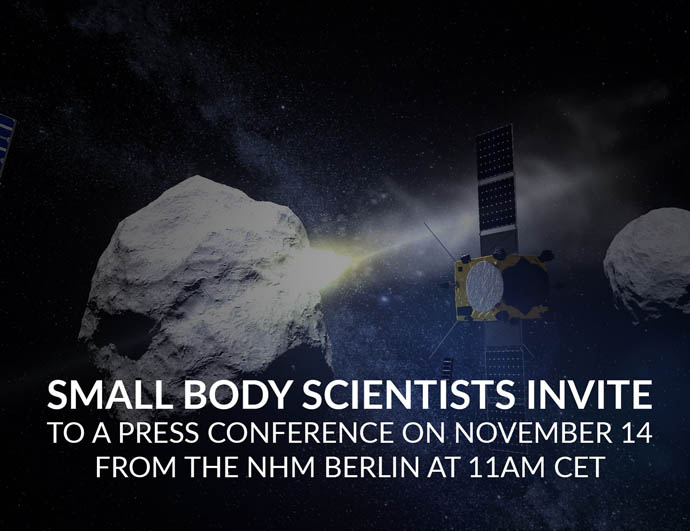Notice of Press Conference: 14 November 2016, Berlin
LEADING SMALL BODY SCIENTISTS, THE OBSERVATOIRE DE LA COTE D’AZUR AND
ASTEROID DAY CO-FOUNDER ANNOUNCE 15,000 GOOD REASONS TO TEST ASTEROID
DEFLECTION AND LAUNCH THE “I SUPPORT AIM” CAMPAIGN

LONDON, UK | BERLIN, GERMANY (8 November 2016) – The co-founder of Asteroid Day, the global movement that helps protect the world from dangerous Asteroids, the Observatoire de la Côte D’Azur, and the Museum fur Naturkunde Berlin will host a joint press conference on Monday, 14 November in Berlin, at 11am CET in the Museum fur Naturkunde (MfN) to highlight the need for increased knowledge of Near Earth Objects (NEOs) and support for the space missions necessary to protect Earth from dangerous NEO impacts.
At the press conference, a letter signed by scores of leading planetary scientists around the world, will be released to the media. The letter shows the community’s support of missions designed to increase our knowledge of asteroids and near Earth objects, in particular ESA’s Asteroid Impact Mission (www.esa.int/aim).
There are several tens of millions of Near Earth Objects (NEOs) larger than 10 meters in size and we have identified just 15,000, as of October, 2016. NEOs are left over matter from the formation of planets and range in size from a few meters to tens of kilometres. As with Earth, NEOs orbit the Sun and sometimes they come dangerously close or can cross Earth’s trajectory – potentially causing impacts. However, with early detection and increased knowledge of the properties of NEOs, we can enhance our tools and techniques under study to deflect NEOs away from Earth.
Whether a kinetic impactor is able to deflect such a small body, when Earth is threatened also depends on internal structure of NEOs. This is what the proposed Asteroid Impact Mission (AIM) within the AIDA international collaboration will help to assess by characterizing for the first time, the small moon of a binary asteroid. This would be the smallest space rock ever visited by a spacecraft. AIM will also demonstrate advanced new technologies for use in future planetary missions and also pave the way to new types of deep-space missions using CubeSats for riskier operations.
The recently completed European Space Agency Rosetta Mission has been hailed for both its technical and engineering feats as well as scientific discovery. Scientists at the press conference will speak about the vital necessity of continuing small body missions, including AIM, to expand our knowledge of the universe we live in and enable us to protect our Earth for the benefit of future generations.
DATE OF PRESS CONFERENCE: 14 November 2016
TIME: 11:00 CET
LOCATION: Museum fur Naturkunde Berlin, Invalidenstraße 43, 10115 Berlin
ACCESS FOR MEDIA: In person at the museum (main entrance doors open at 10:30)
– Journalists requesting 1-1 interviews: a buffet will be organized after the conference allowing direct discussions with the speakers
– Journalists are kindly asked to confirm participation by email to pr@isupportaim.com
PARTICIPANTS:
– Grig Richters (moderator), filmmaker and Asteroid Day co-founder
– Dr. Patrick Michel, AIDA/AIM Principal Investigator, Observatoire Côte d’Azur, CNRS Dr. Kai Wunnemann, Head of Division Impact and Meteorite Research at MfN
– Dr. Holger Sierks, Principal Investigator Rosetta/OSIRIS, Planets and Comets Department at Max Planck Institute for Solar System Research
– Dr. Cornelius Schalinski, Deputy Head Business Development, OHB
– Prof. Alan Harris, Senior Scientist, German Aerospace Center DLR –
Dr. Stephan Ulamec, Philae lander manager and AIM co-investigator, DLR
– Prof. Dr. Jurgen Blum, Head of Planet Formation and Small Bodies group, IGeP, TU Braunschweig
About the Côte d’Azur Observatory
The Côte d’Azur Observatory (OCA) in Nice, France, is a public research centre for Astronomy and Earth sciences. OCA hosts 3 research laboratories, and among them the Lagrange Laboratory of CNRS (National Centre for Scientific Research), which focuses on research in instrumentation, ground/space-based observations and theoretical/numerical modelling in the fields of planetology, fluid mechanics, plasma and solar physics, and cosmology.
About Asteroid Day
Asteroid Day is a global movement to increase public awareness of potential asteroid collisions and the means to protect Earth. It was co-founded in 2015, by Dr. Brian May, astrophysicist and lead guitarist for the rock band Queen, Apollo astronaut Rusty Schweickart, and German filmmaker Grig Richters. Asteroid Day is held on 30 June each year to mark Earth’s largest asteroid impact in recorded history, the Siberia Tunguska event, which devastated over 2000 square km, the size of any major metropolitan city.
About Museum fur Naturkunde Berlin
The Museum fur Naturkunde – Leibniz Institute for Evolution and Biodiversity Science is an integrated research museum within the Leibniz Association. It is one of the most important research institutions worldwide in the areas of biological and geological evolution and biodiversity. It includes research partners in Berlin, Germany and approximately 60 other countries. Over 500,000 visitors per year show that the Museum has become an innovative communication centre that helps shape the scientific and social dialogue about the future of our earth – worldwide.
Media Contact: pr@isupportaim.com
R.S.V.P.